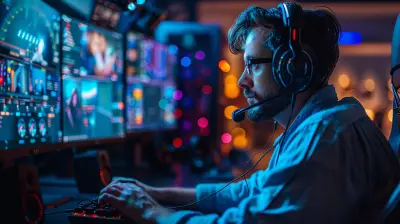The Tragic Legacy of the Munich Olympic Games
30 July 2025
When we think about the Olympic Games, we're usually filled with images of triumph, unity, and human achievement. It's the one time the world drops its differences and cheers for greatness. But not every Olympic memory is golden. One deeply somber chapter in Olympic history is the 1972 Munich Games. What started as a celebration of peace, turned horrifyingly tragic—and left scars that the world still bears today.
Let’s dive deep into the tragic legacy of the Munich Olympic Games and understand why they remain one of the darkest turning points not just in sports, but in global history.
A Hopeful Beginning: The 1972 Munich Games
Before tragedy struck, the 1972 Summer Olympics had a clear mission—to show the world a new, peaceful Germany. After the dark shadow of the 1936 Berlin Olympics under Nazi rule, this was Germany's chance to rebrand.Munich was buzzing with optimism. The architecture was fresh and modern, the slogan “The Happy Games” set the mood, and over 120 nations were gathering to compete. It was supposed to be a showcase of global unity and second chances.
But instead of peace, Munich would be remembered for bloodshed.
The Calm Before the Storm
Security, back then, was drastically different from today's high-alert Olympic events. The atmosphere was intentionally relaxed—to demonstrate that Germany had moved past militarism. Athletes roamed freely, security was minimal, and armed guards were nowhere to be seen.Looking back, it was a chilling cocktail of vulnerability and misplaced trust. And it was exactly what the terrorists were counting on.
The Attack: September 5, 1972
In the early hours of September 5th, eight members of a Palestinian militant group called Black September scaled the fence of the Olympic Village. Armed with assault rifles and grenades, they infiltrated 31 Connollystraße, the housing complex for the Israeli team.The group took eleven Israeli athletes and coaches hostage, quickly executing two of them during the initial standoff. Their demand? The release of 234 Palestinian prisoners held in Israeli jails and two German radicals in custody.
The world held its breath. What should've been a celebration was now a hostage crisis unfolding live on television screens across the globe.
A Failed Rescue Operation
You’d think in a crisis of that magnitude, the world would respond swiftly and effectively, right? Sadly, that’s not what happened.German authorities, lacking experience in counter-terrorism, bungled the rescue operation at Fürstenfeldbruck Air Base. It was supposed to be a carefully coordinated ambush. But with poor planning, weak intelligence, and a lack of communication, the mission spiraled out of control.
All nine remaining hostages were murdered in a brutal and chaotic shootout. A German police officer and five of the eight terrorists were also killed.
The world was left stunned.
The Aftermath: Questions and Anger
Immediately after the massacre, the global reaction was a mix of horror, mourning, and confusion.But Israel was furious. Not just because of the horrific loss, but also due to what they saw as German incompetence and a lack of empathy from the International Olympic Committee (IOC).
The Games were suspended for only 24 hours. That’s right—just one day. Then, as if nothing had happened, competitions resumed. IOC President Avery Brundage famously declared, “The Games must go on.”
That phrase, once meant to inspire resilience, now felt like a slap in the face. Many criticized it as cold, dismissive, and entirely out of touch with the gravity of what had just unfolded.
Mossad’s Response: Operation Wrath of God
Israel didn’t forget. And they certainly didn’t forgive.In what sounds like something from a spy movie (but was very real), Israel launched Operation Wrath of God—a covert campaign to hunt down and assassinate those behind the Munich massacre.
Over several years, Mossad agents tracked down and eliminated key figures of Black September across Europe and the Middle East. The message was loud and clear: Israeli blood wouldn't be spilled without consequences.
While the ethics of extrajudicial killings are hotly debated, for many in Israel, this was justice delivered in the only language terrorists would understand.
Long-Term Impact on Olympic Security
If there’s one thing the Munich tragedy changed forever, it was how the Olympic Games approached security.Before 1972, the Games focused more on pageantry than protection. After Munich, the innocence was gone. Authorities could no longer afford to gamble on good intentions.
Over the years, security at the Olympics became one of the most elaborate operations in the world—sometimes involving armies, surveillance drones, and massive intelligence-sharing efforts. While no system is foolproof, the tragedy in Munich ensured that safety would never again be an afterthought at global events.
The Athletes We Lost
Let’s not forget the human cost. The eleven Israeli victims were more than just headlines—they were fathers, sons, brothers. They were weightlifters, wrestlers, coaches… people who had dedicated their lives to sport and peace.People like Moshe Weinberg, a wrestling coach who fought the attackers and helped one of his teammates escape. Or Yossef Romano, a weightlifter who tried to overpower the terrorists even while wounded.
These weren’t just victims. They were heroes.
Persistent Pain for the Families
For the families of the victims, healing has been far from easy.They’ve spent decades fighting for acknowledgment, transparency, and justice. Germany, for years, was reluctant to admit failures or release classified documents. It wasn’t until the 50th anniversary in 2022 that Germany formally apologized and agreed to compensate the families.
While that gesture was long overdue, it was also a painful reminder of how governments tend to prioritize politics over people.
Media Sensationalism and Ethical Controversies
The Munich massacre was one of the first terrorist attacks to be broadcast almost in real-time. News cameras captured the chaos, panic, and heartbreak as it happened. While it brought global awareness, it also sparked debates about the role of media in such events.Was it right to show the crisis live? Did it help the terrorists gain the publicity they wanted? These questions still haunt journalists and broadcasters today.
A Stain That Won’t Wash Away
Even after all these years, the tragedy of the Munich Olympics lingers like a scar on the face of international sports. It’s the moment the Olympics lost its innocence—a harsh wake-up call that the arena of sports isn't immune to the world's darker realities.Despite the strength, bravery, and unity shown in its aftermath, the 1972 Games will forever be remembered not for medals or records, but for the lives lost and the unimaginable horror many witnessed.
Looking Forward, Without Forgetting
It’s easy to move on and talk about the next Olympic hero, the next gold medal, or the next host city. But history matters—especially when it's as heartbreaking as Munich 1972.The legacy of those Games isn’t just about sorrow. It’s a reminder. A reminder that peace is fragile, that evil can strike when we least expect it, and that security and vigilance must always accompany the celebration of human spirit.
We owe it to the victims, the families, and future generations to keep telling their story—not as a footnote, but as a central chapter in Olympic history.
Final Thoughts
The tragedy of the Munich Olympic Games is more than just a dark moment in sports. It's a crossroad where global politics, terrorism, loss, and unspeakable courage intersected under the glare of the Olympic flame.As sports fans and as people, we must remember that behind every medal ceremony and opening march lies a history shaped by both triumph and tragedy. By honoring the past, we safeguard the future.
Because some games should never be forgotten.
all images in this post were generated using AI tools
Category:
Sports HistoryAuthor:

Nelson Bryant
Discussion
rate this article
1 comments
Candice Long
A sobering reminder of sports' darker moments in history.
August 16, 2025 at 2:58 AM

Nelson Bryant
Thank you for your thoughtful comment. The Munich Olympics indeed serve as a crucial reminder of the complex and often tragic history of sports.


